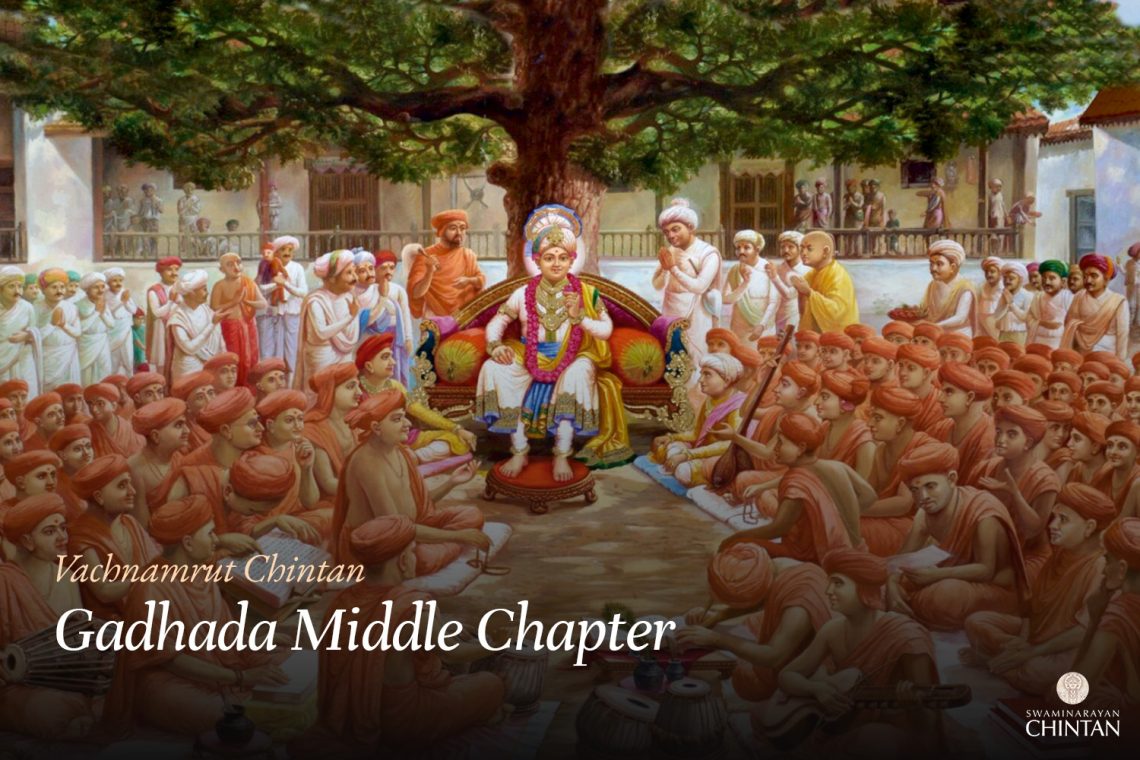Central Insights:
- Giving up maan (ego).
Key Points:
- The jiva does not derive satisfaction from maan.
- One should serve Bhagwan and His devotees to please them, not for praise.
Explanation:
In this Vachanamrut, Shriji Maharaj begins with merciful words. Maharaj says that one who desires to attain Paramatma (the Supreme God) should consider it a great fortune to receive the opportunity to serve Bhagwan or His devotees. This service should be performed with bhakti (devotion) for the sake of Bhagwan’s pleasure and one’s own spiritual welfare, but not for the sake of receiving praise. The greatness of service lies in its ability to grant moksha (liberation) and to please Bhagwan. In Vach.G.M.40, Maharaj states that when a devotee serves a devotee of Bhagwan with mind, speech, and body, such service results in a transformation of the jiva that cannot be attained by any other means. Even performing austerities or virtuous deeds like sacrifices and donations do not match the merit of service to Bhagwan’s devotees. Such is the glory of service to Bhagwan and His devotees. When one receives such an opportunity to serve, one should consider it their great fortune and serve with enthusiasm, solely for the pleasure of Bhagwan and their own welfare—not for the sake of praise.
Maharaj explains that it is the nature of the jiva to enjoy only what feeds its ego. Even if something is harmful or leads to one’s downfall, it will still seem appealing if it satisfies the ego. On the other hand, even if something is beneficial, if it does not bring recognition or respect, one will not be inclined to do it. Therefore, Maharaj says that the jiva derives more pleasure from maan than from anything else. Maharaj gives the analogy of a dry bone: just as a dog carries a dry bone to an isolated place and bites it, the bone, being dry, causes the dog’s mouth to bleed. The dog then licks the bone and enjoys the taste of its own blood. In the same way, a person with maan (ego) does not taste the true sweetness of bhakti (devotion); instead, they enjoy the flavor of their own ego.
In fact, when someone possesses maan, they do not experience the true joy of bhakti—they only taste their own ego. Moreover, maan works in such a way that giving up maan leads to gaining respect from others, while holding onto maan results in disrespect from others. A prideful person is always self-centered, seeing themselves as the only one worthy of worship. Such an attitude causes society to regard them with disrespect. However, bhakti (devotion) to Bhagwan is centered on others, offering respect and reverence to others, particularly Bhagwan and His devotees. This naturally requires humility, service, and reverence toward others.
The world reflects our own attitudes like a mirror. Often, the feelings that others hold toward us are reflections of our own feelings. A person consumed with maan believes that their ego is paramount, and everyone else is unworthy of respect. Such an attitude prevents others from respecting them. On the other hand, a devotee’s humility, discretion, and respect toward others ensure that they receive honor in return. Thus, the principle is reversed: if one gives up maan, they will be respected, but if one seeks respect through maan, they will not receive it. People with maan have been compared to glass vessels: glass is fragile and must be handled with care. Just as packaging for glass items is labeled “Handle with care,” glass is beautiful when intact, but if it accidentally shatters, it harms the person handling it. A prideful person is similar—while they may appear impressive when carefully maintained, a small misstep can cause them to shatter and bring harm to themselves.
Maharaj says that such individuals will engage in bhakti only if their maan is satisfied. Without ego satisfaction, they will not even perform bhakti. Maharaj praises the devotees who are free from maan, like Ratanji and Miyaji, calling them exemplary. Ratanji was a Darbar (nobleman) from Vataman village in Bhal and was a hajuri parsad (personal attendant) of Maharaj. Although he was a brave and accomplished devotee, he was extremely humble. Miyaji was a Muslim devotee from Sardhar who served Maharaj personally.
Muktanand Swami quoted a couplet by Tulsidas: “Kanak tajyo…,” which reflects that even in the spiritual path, bhakti and the pursuit of virtues are driven by two major motivations: one’s ego and the desire to please Bhagwan or His devotees. Often, actions are motivated more by ego than by the desire to please Bhagwan. That is why Tulsidas says, “Man renounces gold and women, but continues to live on the pleasure of his own ego.” For some, the nourishment and sense of purpose derived from maan (ego) are greater than those derived from Bhagwan. When these two forces—ego-centeredness and Bhagwan-centeredness—are in competition, ego often wins. Whereas Bhagwan-centeredness brings divine brilliance only
gradually, the brightness of ego-centeredness is present from birth and carries a kind of obsession. Therefore, Maharaj says that giving up maan is very difficult, and one who gives up maan and worships Bhagwan should be regarded as the greatest among devotees.
Glossary
| Maan – Pride A sense of superiority or self- importance that can separate one from humility and devotion to God. |
| Bhakti – Devotion Loving and selfless worship of God. |
| Dandvat Pranam – Prostration or bowing down A physical gesture of humility and surrender, acknowledging one’s servitude to Bhagwan and His devotees. |
| Paramatma – Supreme God |
| Moksha – Salvation The ultimate liberation of the soul from the cycle of birth and death and reaching divine abode of God |
| Aham – Ego or sense of “I” |
| Mamattva – Attachment or sense of “Mine” |
| Ratanji – A devoted disciple of Bhagwan Swaminarayan |
| Bhagwan-centeredness – Focusing entirely on pleasing Bhagwan |

